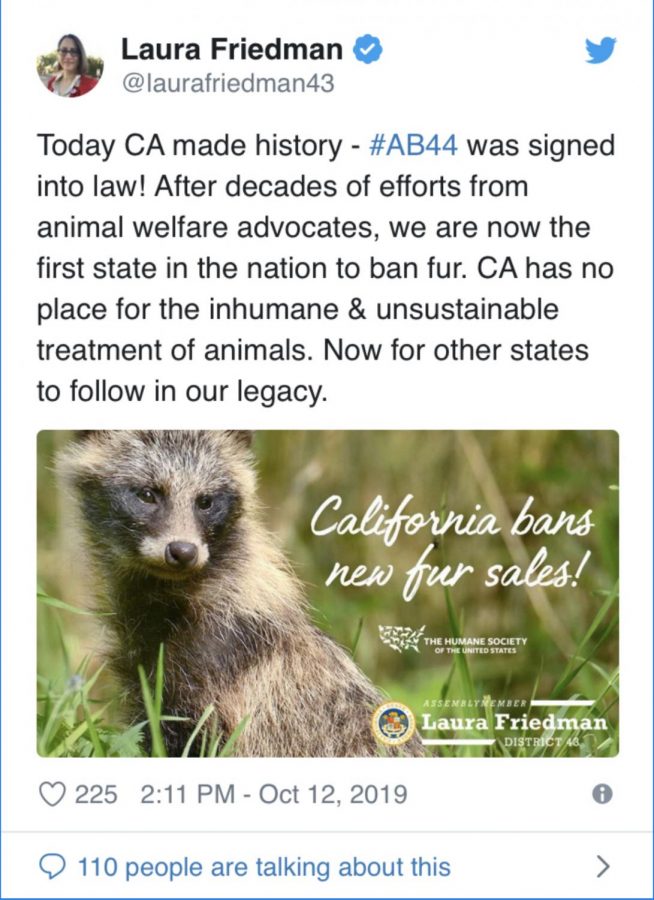“Radical Vegan Agenda” of California
AB44 author Laura Friedman’s tweet celebrating the signing of the fur ban.
October 30, 2019
On October 11, California Governor Gavin Newsom signed bill AB44 into law; it will go into effect on January 1, 2023. This bill makes California the first American state to ban the sale, manufacturing, or donating of new animal fur products.
According to CNN, this excludes “fur [from] taxidermy,… leather, cowhide, and shearling.” The ban also does not apply to fur acquired through legal hunting licenses, or fur with religious, cultural, or ethical purposes.
The fur ban is one of multiple laws made with the intent to prevent animal cruelty. Governor Newsom also signed bans on certain circus animals, the hunting of bobcats, and the slaughter of horses.
The New York Times reports that ”similar bans” have been “introduced in New York, Hawaii, and New Jersey.”
States and localities are being pushed to make such laws in response to the growing efforts of animal welfare activists, such as the Humane Society and the People for the Ethical Treatment of Animals (PETA). PETA Executive Vice President Tracy Reiman stated that “PETA is proud to have worked with compassionate legislators to push these lifesaving laws forward…” This passion for animal rights is shared with YLHS student Bella Saucedo (9) who explains that, “[she] thinks it’s a good ban because then you don’t kill innocent animals for their fur.”
This bill’s existence can be credited to the shrinking prominence of fur in the fashion industry. Fur makes up a small percentage of revenue in local California shops, due to a “waning interest” in fur, as noted by Decades store owner Cameron Silver. The anti-fur sentiment of consumers reflects the initial intent of the author of the bill, Laura Friedman. Friedman posted on Twitter soon after the law was signed, saying that “California has no place for the inhumane and unsustainable treatment of animals.”
However, this ban does not incite enthusiasm in everyone. As one would expect, most opposition to the fur ban is from national industries generating over $300 million in California alone. Teli Spyropoulos, president of one of the largest fur retailers, argued with Friedman over the bill. He highlighted a major economic problem with the bill, which “would result in hundreds of jobs lost within the state” and a “ripple effect across the country… not only affect[ing] the individuals, but their families as well.”
Others may view the ban as a slippery slope towards state consumer regulation: a Fur Information Council spokesperson labeled the ban a “radical vegan agenda,” where fur is the “first step to other bans on what we wear and eat.”





















